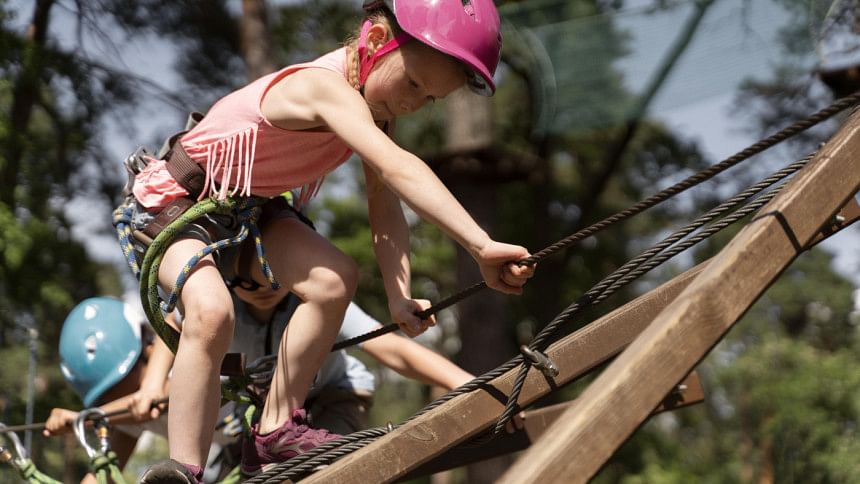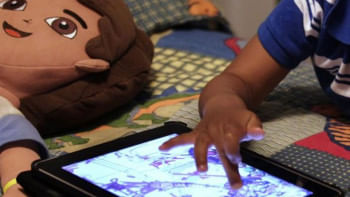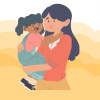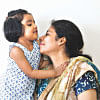Risky play and adventure playgrounds

When I watch kids wholeheartedly enjoy themselves, I see that children in the lowest-income families generally have at least one advantage over their affluent counterparts: the ability to engage in creative, fun and somewhat risky play, rather than be overprotected.
Imagine my surprise in learning that "risky play" (or if you prefer, outdoor, challenging or adventure play) is a major issue. The Canadian Paediatric Society has released a report encouraging parents to resist the urge to over-supervise and overprotect their children. Being "too safe" causes emotional and developmental problems for children that are worse than the occasional injury. The society thus recommends that play be "as safe as necessary" instead of "as safe as possible," observing that outdoor risky play helps prevent and manage common health problems such as obesity, anxiety, and behavioural issues. It is important not to eliminate all risks and leave children with only the most sterile, uninteresting, unchallenging, and unstimulating activities—or worse yet, stuck at home with schoolwork and video games.
Examples of risky play include climbing, jumping, and balancing from a height; cycling or skating quickly; building something with construction tools; playing near fire or water; wrestling, play-fighting, or using sticks; exploring neighbourhoods where kids could get lost; and crashing into people or objects for fun.
Children flourish when given the opportunity to explore their environment and calculate risks. Yes, that involves the occasional minor injury like scrapes, bruises and broken bones (bones heal, especially when you're young). Parents who wish to protect their children from injury are acting from the best motives—but that doesn't mean that their children are benefiting. Sure, it's tough to watch a child take risks and possibly injure themselves, and yet those opportunities are vital for a normal childhood and a proper transition into adult responsibilities.
How does a child learn how high she can safely climb a tree or how fast he can race down a slope if never given the opportunity to do so? How do children learn to identify danger or to deal with pain—physical or emotional—if they have always been protected from it? As Lil Nas X sings, "If I took you everywhere, then well you wouldn't know how to walk." If children get it wrong, they won't be seriously injured and they will learn an important lesson. Adventure play does not include unsupervised play in potentially hazardous situations, such as street play in heavily trafficked areas or pushing children to take risks beyond their comfort level.
A much more prevalent and serious problem than injury is that of children who are inactive, which harms their physical, mental, and socio-emotional health. Too many parents believe that being a good parent means leaving a child with no idle time, who instead should always be focused on academics. However engaging in challenging play can lead to increased levels of physical activity and physical literacy, and improved immune systems. Outdoor play can build resilience, decrease bullying, help children develop conflict resolution skills, improve problem-solving abilities, increase coping skills, reduce anxiety, and gain self-esteem.
In previous generations, Bangladeshi children ran around freely in villages, climbing trees, swimming in ponds, and riding adult-sized bicycles. Boring, formal playgrounds with standard-issue play structures (plastic slides and swings) are no substitute for such active, unsupervised, outdoor adventures. Which brings us to a seemingly contradictory development. In Japan, for the past three decades, "junk playgrounds" (or "adventure playgrounds") have been gaining popularity. Rather than sterile play equipment, which fails to trigger the imagination, junk playgrounds provide open areas and a pile of junk and tools. Kids build what they wish to and design their play. And yes, the injury rate is very low. It's worth learning more about this concept of good play, and challenging ourselves to stop overprotecting our precious children.
Debra Efroymson is a senior adviser at HealthBridge, a Canadian public health NGO.
Views expressed in this article are the author's own.
Follow The Daily Star Opinion on Facebook for the latest opinions, commentaries and analyses by experts and professionals. To contribute your article or letter to The Daily Star Opinion, see our guidelines for submission.

 For all latest news, follow The Daily Star's Google News channel.
For all latest news, follow The Daily Star's Google News channel. 










Comments